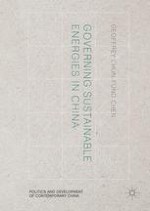2016 | OriginalPaper | Buchkapitel
4. The Chinese State, the Perceived Environmental Crisis, and the Mixed Paradigm for Diffusing Non-Hydro Renewable Energy
verfasst von : Geoffrey Chun-fung Chen
Erschienen in: Governing Sustainable Energies in China
Aktivieren Sie unsere intelligente Suche, um passende Fachinhalte oder Patente zu finden.
Wählen Sie Textabschnitte aus um mit Künstlicher Intelligenz passenden Patente zu finden. powered by
Markieren Sie Textabschnitte, um KI-gestützt weitere passende Inhalte zu finden. powered by
